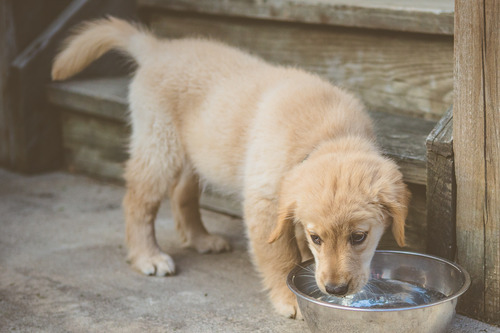Ensuring that your puppy stays hydrated is essential for their overall health and development. But how much water should a puppy drink? This question is common among new pet owners, and understanding the right amount of water intake can help prevent dehydration or overhydration in your furry friend. In this article, we will explore the factors that determine how much water your puppy needs, signs of proper hydration, and tips to ensure they get the right amount. If you have any concerns, please call Shawsheen Animal Hospital at (978) 851-5558 or request an appointment online.
Factors Influencing How Much Water a Puppy Needs
Several factors influence how much water a puppy should drink. These include age, size, diet, activity level, and environmental conditions. Understanding these factors can help you monitor your puppy’s hydration more effectively.
Age and Size of Your Puppy
Puppies are in a rapid growth phase, and their water requirements differ from adult dogs. Younger puppies, especially those under six months, generally need more water relative to their body weight. For example, a puppy may need about half a cup of water every two hours. Larger breeds will naturally require more water than smaller breeds due to their greater body mass and higher energy needs.
Diet and Water Intake
The type of diet you provide significantly impacts your puppy’s water intake. Puppies on a dry kibble diet will need more water than those on a wet food diet, as dry food contains less moisture. Wet food can contribute to your puppy’s daily water intake, which may reduce the amount they drink from their water bowl. Always ensure fresh water is available regardless of their diet.
Activity Level and Hydration
Active puppies burn more energy and, as a result, need more water. Playtime, training sessions, and general exploration can increase your puppy’s need for hydration. After vigorous activity, offer your puppy water to help them rehydrate and recover. However, avoid letting them drink too much water at once to prevent stomach upset.
Environmental Conditions
The climate and weather conditions also affect your puppy’s water requirements. Puppies in warmer climates or during hot weather will need more water to stay hydrated and regulate their body temperature. Ensure that your puppy has access to cool, fresh water at all times, especially during summer months or after outdoor activities.
Signs of Proper Hydration in Puppies
Knowing the signs of proper hydration can help you ensure your puppy is getting enough water. Observing these signs can prevent potential health issues related to dehydration or overhydration.
- Healthy Skin and Coat: A well-hydrated puppy will have a shiny, healthy coat and supple skin. One way to check hydration levels is to gently lift the skin on the back of your puppy’s neck. If the skin quickly returns to its original position, your puppy is likely well-hydrated. If the skin takes time to settle back, it may indicate dehydration.
- Regular Urination: Puppies that are properly hydrated will urinate frequently, and their urine will be a pale yellow color. Darker urine can indicate dehydration. Keeping track of your puppy’s urination habits can help you monitor their hydration status.
- Alertness and Activity: A hydrated puppy will be active, playful, and alert. Lethargy and excessive sleepiness can be signs of dehydration. If your puppy seems unusually tired or uninterested in activities, it might be a good idea to check their water intake.
How to Encourage Your Puppy to Drink More Water
Sometimes, puppies may not drink enough water on their own. Here are some tips to encourage better hydration habits.
Provide Fresh Water Regularly
Always provide fresh, clean water for your puppy. Change the water several times a day to keep it appealing. Puppies are more likely to drink water that is clean and free from debris.
Use Multiple Water Bowls
Place water bowls in different areas of your home to make it convenient for your puppy to access water. This is especially helpful if you have a larger house or multiple floors.
Add Water to Food
If your puppy is on a dry kibble diet, consider adding a small amount of water to their food. This can help increase their overall water intake and make the food more palatable.
Potential Risks of Overhydration
While it’s essential to ensure your puppy drinks enough water, overhydration can also pose risks. Understanding these risks can help you maintain a balanced water intake for your puppy.
Water Intoxication
Water intoxication, though rare, can occur if a puppy drinks an excessive amount of water in a short period. Symptoms include lethargy, bloating, vomiting, and in severe cases, seizures. If you suspect water intoxication, seek immediate veterinary care.
Regulating Water Intake
To avoid overhydration, provide water at regular intervals, especially after exercise or playtime. Monitor your puppy’s drinking habits and consult with your veterinarian if you notice any unusual behavior.
Monitoring Your Puppy’s Water Intake
Keeping track of your puppy’s water intake helps ensure they are hydrated properly. Keep a log of how much water your puppy drinks each day. This can help you notice any changes in their drinking habits that may indicate health issues. If you have concerns about your puppy’s water intake, consult with your veterinarian. They can provide personalized advice based on your puppy’s specific needs and health status.
The Importance of Your Puppy’s Hydration
Ensuring that your puppy gets the right amount of water is vital for their health and well-being. By understanding the factors that influence their water needs and monitoring their hydration, you can help your puppy grow and thrive. If you have any questions or concerns about your puppy’s water intake, please call Shawsheen Animal Hospital at (978) 851-5558 or request an appointment online.






